
A House for Mr Biswas is a 1961 novel by V. S. Naipaul, significant as Naipaul's first work to achieve acclaim worldwide. It is the story of Mohun Biswas, a Hindu Indo-Trinidadian who continually strives for success and mostly fails, who marries into the influential Tulsi family only to find himself dominated by it, and who finally sets the goal of owning his own house. It relies on some biographical elements from the experience of the author's father.

A Bend in the River is a 1979 novel by Nobel laureate V. S. Naipaul.

The Borough of Chaguanas is the largest municipality and fastest-growing town in Trinidad and Tobago. Located in west-central Trinidad, south of Port of Spain, north of Couva and San Fernando, and named after the indigenous tribe who originally settled there, it grew in size due to its proximity to the Woodford Lodge sugar refinery. It remained a minor town until the 1980s when it began to grow rapidly as it drew people for its bargain shopping and moderately priced housing. Its rapid growth has seen property values increase dramatically, however.
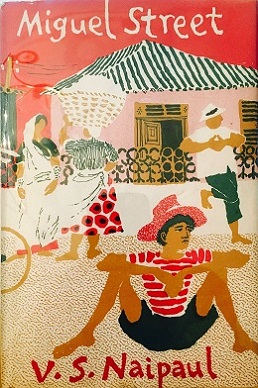
Miguel Street is a collection of linked short stories by V. S. Naipaul set in wartime Trinidad and Tobago. The stories draw on the author's childhood memories of Port of Spain. The author lived with his family in the Woodbrook district of the city in the 1940s, and the street in question, Luis Street, has been taken to be the model of Miguel Street. Some of the inhabitants are members of the Hindu community to which Naipaul belonged. Naipaul also draws on wider Trinidadian culture, referring to cricket and quoting a number of lyrics by black calypso singers.

The Enigma of Arrival: A Novel in Five Sections is a 1987 novel by Nobel laureate V. S. Naipaul.

Guerrillas is a 1975 novel by V. S. Naipaul. The book is set on an unnamed, remote Caribbean island populated by a mix of ethnicities, but dominated by post-colonial British. Probably the island is modelled after Trinidad, Naipaul's birthplace.

In a Free State is a novel by V. S. Naipaul published in 1971 by Andre Deutsch. It won that year's Booker Prize. The plot consists of a framing narrative and three short stories – "One out of Many", "Tell Me Who to Kill", and the title story, "In a Free State". The work is symphonic, with different movements converging towards a common theme; although the theme is not spelled out, it evidently concerns the price of freedom, with analogies implicitly drawn among the three scenarios.

The Loss of El Dorado, by the Nobel Prize winner V. S. Naipaul, is a history book about Venezuela and Trinidad. It was published in 1969. The title refers to the El Dorado legend.
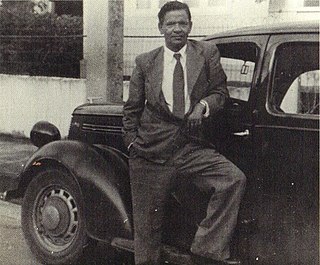
Seepersad Naipaul was a Trinidadian writer. He was the father of writers V. S. Naipaul, Shiva Naipaul and Savi Naipaul Akal, and married into the influential Indo-Trinidadian Capildeo family.

The Mystic Masseur is a 2001 Merchant Ivory film based on the novel of the same name by V. S. Naipaul. It is one of relatively few films directed by Ismail Merchant, who is better known as the producer in the Merchant Ivory partnership, and addresses issues of Hindu subculture in Trinidad and Tobago.
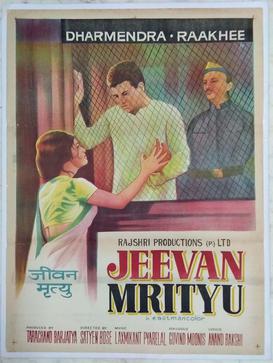
Jeevan Mrityu is a 1970 Hindi-language crime thriller film produced by Tarachand Barjatya for Rajshri Productions. The film starred Dharmendra, Raakhee, Ajit, Rajindernath and Leela Chitnis. The film was a remake of a 1967 Bengali film Jiban Mrityu starring Uttam Kumar and Supriya Devi in lead roles. The film's music was composed by Laxmikant Pyarelal while Anand Bakshi penned the lyrics. The film was dubbed in Malayalam as Jeevitha Samaram.
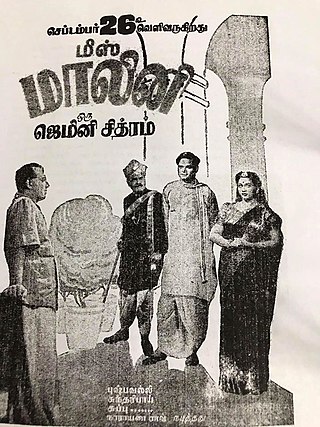
Miss Malini is a 1947 Indian Tamil-language satirical film written and directed by Kothamangalam Subbu and produced by K. Ramnoth, based on a story by R. K. Narayan. Subbu also starred in the film alongside Pushpavalli and M. S. Sundari Bai. Javar Seetharaman and Gemini Ganesan made their acting debuts in the film appearing in minor supporting roles. The film focuses on Malini (Pushpavalli), an impoverished woman who joins her actress friend Sundari's theatre company Kala Mandhiram and becomes a success. Things take a turn for the worse when she befriends a charlatan named Sampath.

The Users is a 1978 American made-for-television drama film directed by Joseph Hardy. The film, whose executive producer was Aaron Spelling, is based on a Joyce Haber novel released in the same year. The film focuses on the insiders of the Hollywood film industry.
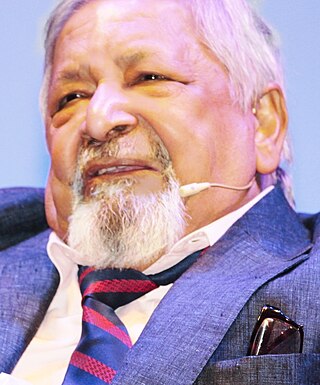
Sir Vidiadhar Surajprasad Naipaul was a Trinidadian-born British writer of works of fiction and nonfiction in English. He is known for his comic early novels set in Trinidad, his bleaker novels of alienation in the wider world, and his vigilant chronicles of life and travels. He wrote in prose that was widely admired, but his views sometimes aroused controversy. He published more than thirty books over fifty years.
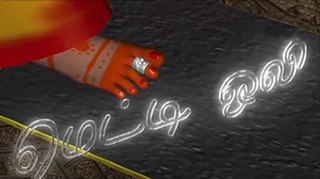
Metti Oli was an Indian Tamil-language soap opera that aired on weekdays on Sun TV for 811 episodes. The show starred Delhi Kumar, Kaveri, Gayathri, Vanaja, Uma Maheshwari, Revathi Priya, Chetan, Bose Venkat, Neelima Rani, Thirumurugan and Shanti Williams. It was produced by Cine Times Entertainment S.Siddiq, and written and directed by Thirumurugan. The serial was followed by Muhurtham of Cine Times Entertainment. In 2019 this show was telecast by Moon TV and during Covid-19 by Sun TV
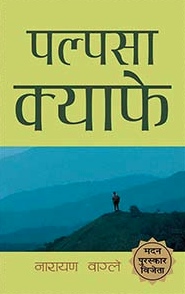
Palpasa Cafe is a novel by Nepali author Narayan Wagle. It tells the story of an artist, Drishya, during the height of the Nepalese Civil War. The novel is partly a love story of Drishya and the first generation American Nepali, Palpasa, who has returned to the land of her parents after 9/11. It is often called an anti-war novel, and describes the effects of the civil war on the Nepali countryside that Drishya travels to.

The Mimic Men is a novel by V. S. Naipaul, first published by Andre Deutsch in the UK in 1967.
Tekkatte Narayan Shanbhag (1925-2009) was an Indian scholar, bookseller and the founder of Strand Book Stores. He was credited with working to transform bookselling into a personal experience, prompting the writer Kushwant Singh, on a BBC show, to call Strand the only personal book shop in India. He was honoured by the Government of India in 2003 with Padma Shri, the fourth highest Indian civilian award.

The Jumbie Bird is the first novel by Trinidad and Tobago-born novelist Ismith Khan. Published in 1961, the semi-autobiographical novel tells the story of the Khan family, an Indo-Trinidadian Muslim family living in Port of Spain. The novel explores the transformation of formerly indentured Indian immigrants in Trinidad and Tobago into Indo-Trinidadians.
Robert Flavell Micklewright (1923–2013) was a British artist, illustrator and designer. He worked as a freelancer and designed dust jackets for books by C. P. Snow and V. S. Naipaul, and posters for London Transport. According to The Guardian, his work was "always of a high standard".
















